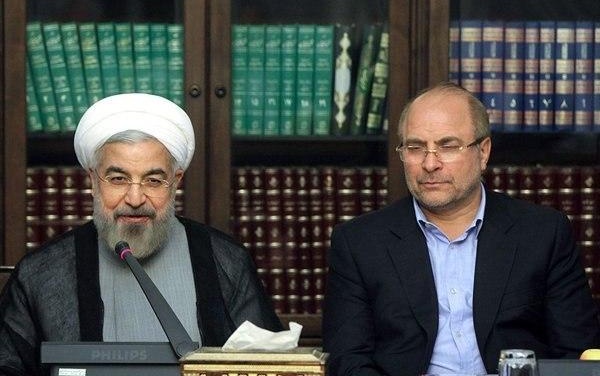Iran’s President Hassan Rouhani (L) and Parliament Speaker Mohammad Baqer Qalibaf (File)
Despite taking a harder public line with the US and the international community, Iran’s President and Parliament are clashing over Tehran’s position on the nuclear deal with the remaining 5+1 Powers (UK, France, Germany, China, and Russia).
On Sunday, Iran confirmed limits on inspections of its nuclear facilities, following a visit from International Atomic Energy Agency head Rafael Grossi.
Tehran is withdrawing from the Additional Protocol of the Nuclear Non-Proliferation Treaty, restricting any “snap” inspections by the IAEA, and withholding the video surveillance tapes of regular monitoring.
See also Iran to Proceed with Limits on Nuclear Inspections
But Parliament, which triggered the harder line with legislation in December, is pressing President Hassan Rouhani that he has not gone far enough.
Parliament Speaker Mohammad Baqer Qalibaf, who may have ambitions in June’s Presidential election, tweeted that the arrangement with the IAEA “requires parliamentary approval” and “cannot be implemented”.
Rouhani hit back on Wednesday at a Cabinet meeting. Without naming Qalibaf or Parliament, he chided:
How many times should the Supreme Leader of the Revolution repeat that we must observe Islamic respect, etiquette and ethics; why do not we listen?
Do not weaken the will of the people and do not let people be disappointed of the future. Everybody must understand the current critical situation: are we allowed to use the podium we have to play with people’s nerves?
He avoided the specifics of inspections, but continued his pushback: “Everyone should know that anything that calls into question the peaceful nature of our country’s activities is wrong and this is what the enemy wants….We want to have a peaceful activity, but why should the ill-wishers be given a non-peaceful signal?”
The President also defended Iran’s continued adherence to the deal, despite the withdrawal of the Trump Administration in May 2018 and comprehensive US sanctions six months later. He said that it took a “weapon from the enemy”, blaming Iran for instability, and blocked any scrutiny of Tehran’s ballistic missiles program.
The Biden Administration has signalled that it is ready for informal discussions with Iran, accepting an invitation from the European Union. However, both Washington and the European participants in the deal — the UK, France, and Germany — want revision to cover ballistic missiles and to extend the terminal date of provisions.
Iran is still considering a formal response to last week’s invitation by the EU.
See also Biden Administration Ready for Nuclear Talks with Iran
The Iranian Parliament seized the initiative in December with a bill ordering the Government to suspend provisions in the nuclear deal if US sanctions were not removed by February. They included Iran’s return to pre-2015 enrichment of 20% uranium, installation of more advanced centrifuges, and the withdrawal from the Additional Protocol.
Qalibaf maintained the pressure despite an injunction from the Supreme Leader on Monday. Ayatollah Khamenei backed Parliament’s “good bill” but said of the in-fighting, “These differences are solvable and the two sides must cooperation to resolve them. The differences must not widen, which would show division.”
On Wednesday, Qalibaf said Khamenei’s call for “unity and understanding is our responsibility”.
He did not step back from Parliament’s criticism of the Government arrangements over inspections; however, he tweeted, “Many could not believe that the nuclear industry would return to its honorable days in such a time span and turn into an opportunity for bargaining on lifting of sanctions.”

